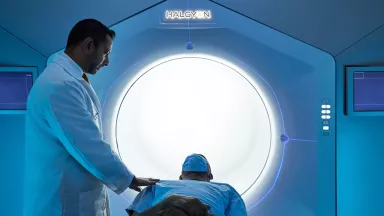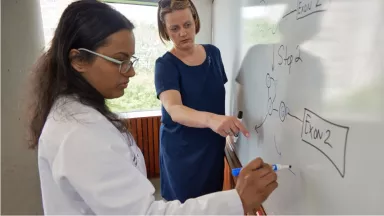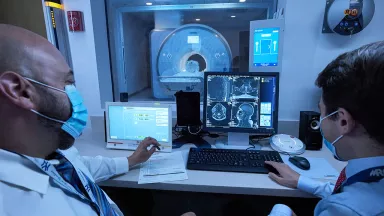Blood Cancer Institute Translational Research & Clinical Trials
The Blood Cancer Institute is looking for new treatment options for people with lymphoma, leukemia, MDS, myeloma and other blood cancers through its robust translational research and clinical trials program.
Current Need
All mature blood cells are generated from bone marrow stem cells, a cell population defined by its ability to both self-renew and develop into more mature blood cell populations. When stem cells or their progenitor populations acquire genetic mutations, leukemia and other blood cancers can arise, leading to life-threatening low blood counts, infections, and bone marrow failure.
While chemotherapy is the mainstay of treatment, relapses are common. And most patients are 60 years or older and ineligible for chemotherapy or stem cell transplantation, which leaves them with limited therapeutic options to address their cancer at its root.
The Leukemia Example
Institute translational research in one blood cancer alone – leukemia – includes the broad-ranging examination of:
- The efficacy of targeting leukemia stem cells by combining chemotherapy and the chemotherapy drug Venetoclax in younger AML patients fit for therapy
- The optimization of hypomethylating therapy combined with venetoclax in AML patients unfit for intensive chemotherapy
- The efficacy of novel targeted therapies and combinations, including STAT3 inhibitors and degraders, menin inhibitors, FLT3 inhibitors, BCL-2/XL dual inhibitors, IRAK4 inhibitors, IL1RAP inhibitors, PAK1 inhibitors, and TGFβ signaling pathway inhibitors
- The safety and efficacy of immune therapies in AML, including novel NK cell engagers and cellular therapies
Investigator-Initiated Trials (IITs) for Blood Cancers
On the leading-edge of the Blood Cancer Institute’s translational research are IIT’s spurred by investigator recognition of a grave medical need requiring new treatment. When it comes to blood cancer, many such efforts are underway – and hold the promise of altering patient outcomes.
Recent IIT’s in AML are excellent examples.
AML & MDS Trial
Institute member Mendel Goldfinger, MD, director of the Montefiore Hematologic-Malignancy Network, serves as principal investigator of a Phase II trial studying metabolically optimized, non-cytotoxic low dose weekly decitabine and venetoclax in AML and MDS patients unfit for induction therapy.
Currently, the combination of venetoclax and azacitidine is the standard of care for AML patients greater than 75 years of age and/or unfit for induction chemotherapy.
However, the use of this combination is often limited by toxicity and cytopenias, with many patients receiving standard dosing require dose interruptions, treatment delays, and dose reductions. Furthermore, this combination has limited activity in P53-mutant MDS/AML, a subgroup of patients with poor prognosis and limited treatment options.
The current clinical trial proposes to combat the challenges of venetoclax and azacitidine by evaluating the tolerability of a non-cytotoxic, once-weekly dosing of decitabine in combination with once-weekly dosing of venetoclax.
Study Rationale
The rationale of this study is two-fold. First, low-dose, once weekly decitabine has been shown to have minimal toxicity and myelosuppression compared to standard hypomethylating agents (HMAs), and this finding is conserved in P53-mutant patients. Second, preclinical studies have demonstrated that adding a dose of venetoclax prior to administering decitabine can enhance the anti-leukemic activity of HMAs like decitabine. Importantly, decreasing the dose of venetoclax to a weekly schedule is also expected to decrease myelosuppression. Preliminary results of a small cohort of P53-mutant MDS/AML patients presented at the 2022 Society of Hematologic Oncology Annual Meeting demonstrated that this regimen is well tolerated, as patients treated are able to withstand sustained drug exposure while yielding high response rates.
AML & MDS Trial
Institute member Ioannis Mantzaris, MD, MS, Associate Professor of Oncology and Medicine, serves as principal investigator of the Phase 1b trial studying venetoclax in combination with standard intensive chemotherapy in newly diagnosed AML and high risk-MDS patients fit for induction therapy.
Currently, younger AML patients who are fit for induction chemotherapy receive the 7+3 regimen of cytarabine (AraC) and an anthracycline (daunorubicin, idarubicin), followed by consolidation therapy with high dose AraC (HiDAC). While approximately 70% of patients achieve a complete remission, with 30-50% of patients achieving MRD negativity, relapse due to residual chemotherapy-resistant leukemic stem cells (LSCs) is prevalent. The potential synergistic combination of venetoclax with intensive chemotherapy (IC) has shown encouraging safety and efficacy results; however, optimal venetoclax dose in combination with chemotherapy to eradicate LSCs remains unknown.
Study Rationale
This open-label, dose-escalating study aims to determine the safety, efficacy, and maximum tolerated dose (MTD) of venetoclax in combination with IC and HiDAC, the efficacy of the combination in LSC eradication will be evaluated by novel high-resolution MRD assays and high-throughput single-cell sequencing. The study design was presented at the 2022 64th American Society of Hematology Annual Meeting and Exposition (Abstract #1455).
Select Additional Clinical Trials in AML & MDS Through the Blood Cancer Institute
Acute Myeloid Leukemia (AML)
- Metabolically Optimized, Non-Cytotoxic Low Dose Weekly Decitabine/Venetoclax in MDS and AML NCT05184842
- Venetoclax plus Intensive Chemotherapy in AML and Advanced MDS NCT05342584
- Tamibarotene plus Venetoclax/Azacitidine in Participants with Newly Diagnosed AML NCT04905407
- A Clinical Trial to Learn About the Study Medicine (TTI-622) Alone and When Used in Combination with Other Medicines to Treat Participants with Advanced Hematological Malignancies, Including Lymphoma, Leukemia and Multiple Myeloma NCT03530683
- A Study of SNDX-5613 in R/R Leukemias including those with an MLLr/KMT2A Gene Rearrangement or NPM1 Mutation (AUGMENT-101) NCT04065399
- Dose Escalation/Expansion Trial of CA-4948 as Monotherapy and in Combination with Azacitidine or Venetoclax in Patients with AML or MDS NCT04278768
- Efficacy of MT-401 in Patients with AML Following Stem Cell Transplant NCT04511130
- A Study Evaluating Safety and Efficacy of Venetoclax in Combination with Azacitidine versus Standard of Care after Allogeneic Stem Cell Transplantation (SCT) in Participants with Acute Myeloid Leukemia (AML) (VIALE-T) NCT04161885
Myelodysplastic Syndrome (MDS)
- Metabolically Optimized, Non-Cytotoxic Low Dose Weekly Decitabine/Venetoclax in MDS and AML NCT05184842
- Venetoclax plus Intensive Chemotherapy in AML and Advanced MDS NCT05342584
- Dose Escalation/Expansion Trial of CA-4948 as Monotherapy and in Combination with Azacitidine or Venetoclax in Patients with AML or MDS NCT04278768








